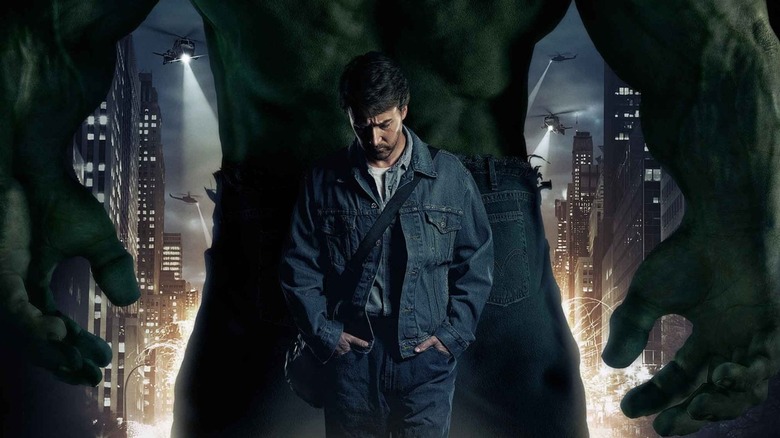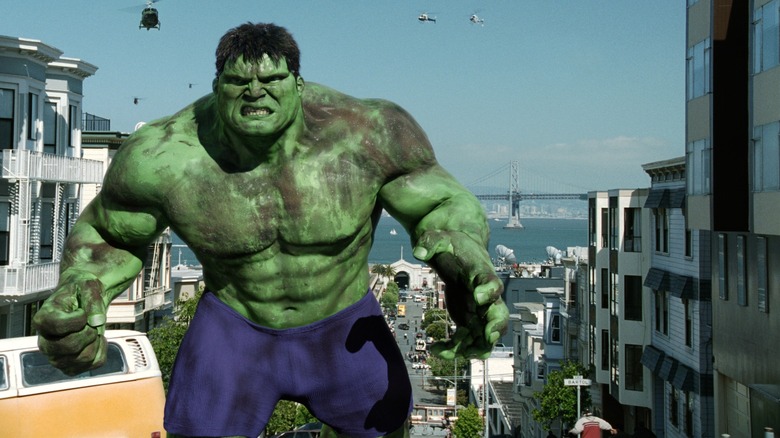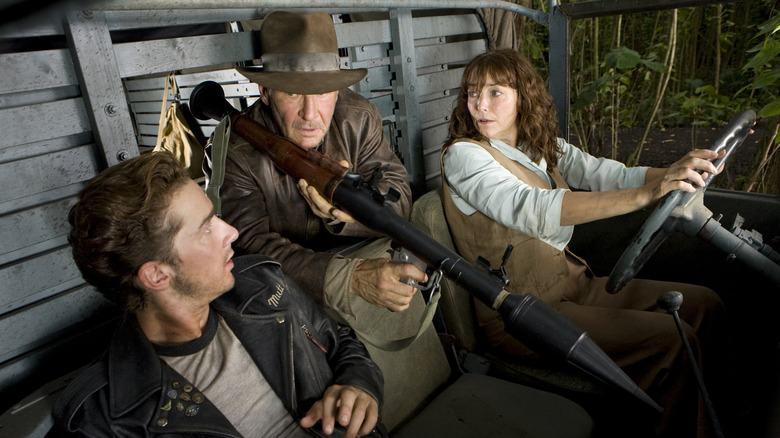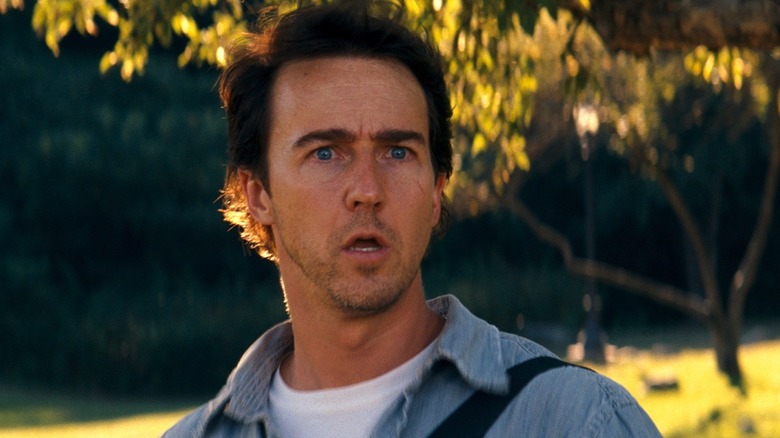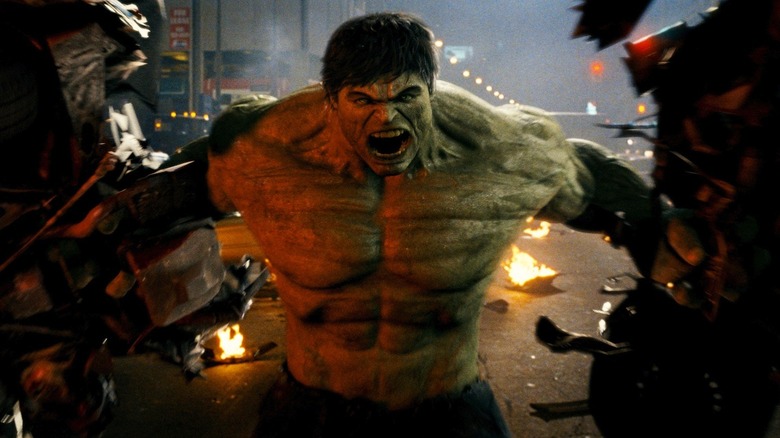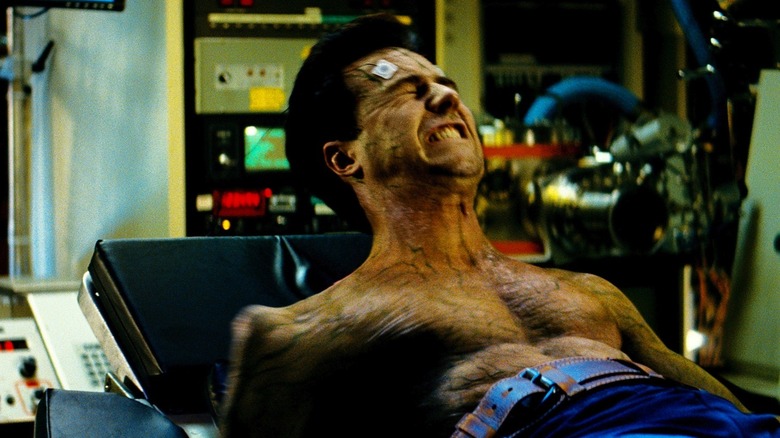Why The Incredible Hulk Disappointed At The Box Office, And What We Can Learn From It
2008 feels like an eternity ago for the Marvel Cinematic Universe. That is mostly because, in a lot of ways, the idea of an interconnected universe of comic-book movies that would eventually crossover didn't exist. "Iron Man" was a surprise hit, and Marvel Studios had just one other movie coming out that year: "The Incredible Hulk." Starring Edward Norton, this was intended to be the second film that would build to "The Avengers" and, if that went well, perhaps something even bigger.
As we know now, it all went quite well, and the MCU remains the most bankable brand in the industry. Be that as it may, the first and only solo "Hulk" film officially in the MCU remains a low-point and is by far the lowest-grossing entry in the franchise to date — though not bad enough to derail the studio's larger plans.
So, what went wrong exactly? The answer is complicated and there's not a single factor to blame.
2003's Hulk left a bad taste
It's important to remember that a mere five years earlier, in the wake of the success of "X-Men" and "Spider-Man," director Ang Lee tried to bring Bruce Banner to the big screen with Eric Bana playing the titular role. 2003's "Hulk" was not quite up to modern superhero movie standards and certainly didn't thrill audiences in the same way that "Spider-Man" or "X2" did. To that end, the film carries an abysmal 29% audience approval rating on Rotten Tomatoes. That all but renders the decent 62% critical approval rating obsolete.
The film topped out at $245 million worldwide at the box office, which is not nearly enough to justify its $137 million production budget, even at a time when home video sales were far more robust. All of this to say, Lee's "Hulk" may well have left a bad taste in audience's mouths and five years is a very short turnaround time for a reboot.
Heavy competition
It's important to point out as well that 2008 was a radically different time for Marvel Studios in terms of distribution. They had cut a deal with Paramount Pictures on that front as the Disney buyout of Marvel wouldn't come until several years later. However, it was Universal Pictures that released director Louis Leterrier's "The Incredible Hulk" as the studio controls the rights to solo pictures starring the Hulk, and actually still does to this very day. That's why Mark Ruffalo's Hulk only ever appears in team-up films. The point is, there were two studios dealing with two different superhero films looking to get a bite at the summer box office, and it was a busy summer at that.
"Iron Man" arrived in theaters in May of 2008 and became a huge, unexpected hit. In the weeks after that, we had "Indiana Jones and the Kingdom of the Crystal Skull," "Sex and the City," and "Kung Fu Panda," amongst others. Then, Universal decided to bring "The Incredible Hulk" to theaters on June 13, just over a month after Tony Stark wowed the moviegoing public. While the film did top the charts in its first weekend, taking in a respectable $55.4 million, it was uphill sledding from there.
"The Happening" was released that same weekend and, the following week, "Get Smart" took the box office crown away, with "The Incredible Hulk" dropping 60% and taking in a mere $22.1 million. It got no easier when both "WALL-E" and "Wanted" arrived the weekend after that. And so, Norton's solo Hulk flick topped out at $134 million domestic to go along with $130 million internationally for a grand total of $264 million against a reported $150 million budget. Not exactly a heroic total. Heavy competition may have been the biggest thing working against this film.
The reviews were merely okay
Competition is one thing, but the right film can rise above a lot of noise and become a hit if audiences want it badly enough. The problem with "The Incredible Hulk" in that department is that the reviews and word-of-mouth were not strong enough to carry the film. Critically speaking, its reception was mixed-to-okay, as "The Incredible Hulk" holds a 67% critical approval rating on Rotten Tomatoes, with the audience score sitting at a similarly lukewarm 70%. That's fine but certainly not great. While certain Marvel fans have really come around to this movie in the years since its release, at the time, the general consensus was not that of a must-see superhero adventure. That, coupled with the heavy competition, did it precisely no favors.
The MCU hadn't quite formed yet
Before Marvel Studios started seriously building up to 2012's blockbuster record-breaker "The Avengers," the idea of a cinematic universe simply didn't exist. Sure, Marvel Comics had been doing crossovers for decades and, oddly enough, Kevin Smith's Askewniverse that includes movies like "Clerks" and "Chasing Amy" was maybe the closest thing we had before the MCU (the original Universal Classic Horror monster movies notwithstanding). Point being, the notion of having to see the next movie because it would potentially tie into something larger was not yet established in the MCU.
Perhaps even a couple of years later, a bit closer to the end of Phase 1 of the MCU, "The Incredible Hulk" could have benefited from this sort of thinking from audience members. It is a little hard to imagine that "Thor" would have made $449 million worldwide in 2008 like it did in 2011, for example. At the time when "The Incredible Hulk" released, it was just another superhero movie with a superhero that audiences were familiar with, but not on the level that it made the movie a must-see event.
The lessons contained within
In the case of this movie, there were no egregious mistakes made by the studio or the filmmakers to point to and shake your head at. It's a situation where a perfect storm led to a disappointing result. In the wake of the superhero movie boom, it makes every bit of sense to produce a project like "The Incredible Hulk," especially with the promise of building to something much larger. It's just unfortunate that it had to happen in the same summer that "Iron Man" became an instant fan-favorite and "The Dark Knight" would go on to become one of the greatest comic-book movies ever made.
It certainly would have benefitted "The Incredible Hulk" if it had been released some distance from a summer packed with competition. Who knows? If it wasn't sandwiched between so many other big movies, maybe it would have gotten a better shake at the box office. The reviews certainly weren't bad enough to blame Leterrier for its failure. Universal certainly deserves some scrutiny for choosing a release date with such high competition. Beyond that, it just wasn't meant to be.
